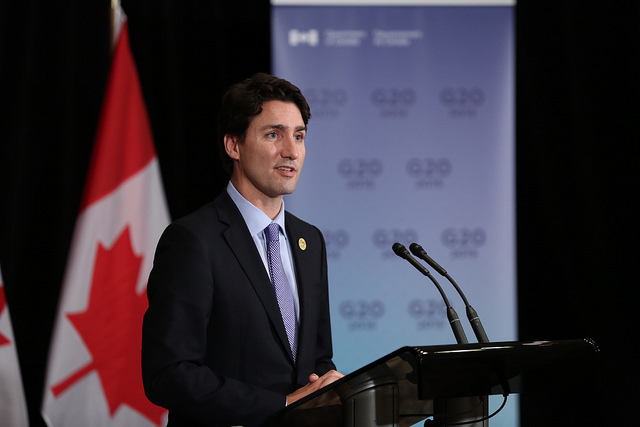Like this article? rabble is reader-supported journalism. Chip in to keep stories like these coming.
When it suits them, Canadian politicians embrace the rights established in the Canadian Charter of Rights and Freedoms. But there are limits, and most of them unaccountably seem to have to do with Israel.
Two years ago, for example, then-prime minister Stephen Harper insisted that Israeli policies should not be criticized, especially in public. To criticize Israel, he said, is to be guilty of “the new anti-Semitism….It targets the Jewish people by targeting Israel.”
Why it was anti-Semitic to criticize the Israel government for its housing or land or human-rights policies, as indeed so many Israelis do, Mr. Harper never explained.
Nor did he ever bother spell out why accusing Israel of being an apartheid state is the ultimate form of anti-Semitism. Yet it makes no sense. Labelling Israel an apartheid state may be jarring, but that makes it neither inaccurate nor anti-Semitic. When Israelis call Israel an apartheid state — as many do — are they anti-Semitic too? How did Mr. Harper arrogate to himself the right to decide what Canadians were authorized to say about this one foreign government?
After all, Section 2, Clause 1, of the Charter, called Fundamental Freedoms, reads as follows:
Everyone has the following fundamental freedoms:
1. Freedom of conscience and religion; freedom of thought, belief, opinion and expression…
There are no exceptions I can find here when it comes to criticism of Israel.
Last month, the Conservatives raised an apparently even more ultimate form of anti-Semitism. This time, they brought almost the entire Liberal government with them. The essence of the subject was identical. This time, the crime that didn’t deserve Charter protection wasn’t labelling Israel an apartheid state. It was promoting the perfectly legal, peaceful, non-violent international campaign of Boycott, Divestment and Sanctions (BDS) against Israel. An overwhelming number of MPs have now voted to condemn any attempt by Canadians to offer support for the BDS campaign.
The merits of the BDS campaign are as irrelevant as whether Israel is an apartheid state. In both, the core Canadian issue is free speech — my right to say freely whatever I think about Israel and its policies. Just as I have the right to say whatever I want about my own government’s policies, or Washington’s, or Costa Rica’s, or Cuba’s. Yet a large majority of our MPs want to remove that right from me when it comes to my opinion of Israel. For them, promoting BDS is not a legitimate form of criticism of Israel, but, in the words of the motion, its “demonization and delegitimation.”
Yet the BDS’s 2005 manifesto called on Israel to comply “with international law and universal principles of human rights,” end its “occupation and colonization of all Arab lands,” and recognize “the fundamental rights of Arab-Palestinian citizens to full equality.” This now constitutes anti-Semitism? In the real world, it actually reflects both international law and official Canadian foreign policy.
And in a debate related to Israeli government policies, how is it that not a single MP bothered to point out that the latest Netanyahu government has been the harshest yet in its treatment of Israeli human-rights advocates, Palestinian Israelis and Palestinians.
Conservative MP Jason Kenney seemed to have been the most extreme in his pronouncements, as he was when he was a cabinet minister. “The BDS movement,” he proclaimed, “represents a new wave of anti-Semitism, the most pernicious form of hatred in the history of humanity.”
My goodness. Is this a victims’ competition? Somehow Mr. Kenney is in a position to assert that centuries of brutal exploitation of black-skinned people were less pernicious than centuries of anti-Semitism, that abuse of women throughout history was (is?) less pernicious than anti-Semitism, that the genocides by white settlers of Indigenous peoples everywhere were less pernicious than anti-Semitism.
It was clear from the contribution to the debate by Foreign Affairs Minister Stéphane Dion that he was deeply ambivalent about supporting the Conservative motion. But like the vast majority of Liberals — yes, including their Leader — he also decided that it’s never a smart move to cross the Canadian Jewish establishment. It is a tiny but tenacious group, and its political organizations can make life intolerable for any one who dares to cross it. So all but a handful of Liberals took the path of least resistance and least principle.
Three loud cheers then for the NDP, which once again played the role it was born to play — to put principles above craven political opportunism. The NDP collectively voted against this shameful motion, not because it approves of the BDS movement — party leader Tom Mulcair most ardently does not — but because it won’t support the suppression of legitimate free expression.
It’s a funny irony. The media have recently been full of that grand moment in Canadian history when Prime Minister Pierre Trudeau proclaimed that the state has no business in the bedrooms of the nation. Now, here is Prime Minister Justin Trudeau significantly modifying that dictum. The state may not belong in our bedrooms, but it apparently belongs in our minds.
Well, like many others, I completely repudiate this latest attempt at intimidation.
When Stephen Harper told us what to think, many of us told him where to go. There’s lots of room left for the House of Commons majority.
This article originally appeared in The Globe and Mail.
Like this article? rabble is reader-supported journalism. Chip in to keep stories like these coming.
Image: Flickr/PMWebPhotos



